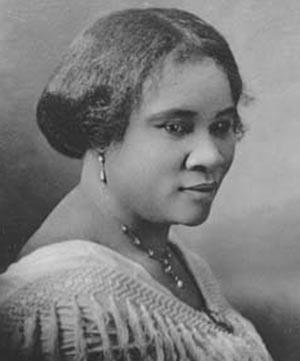Madame C.J. Walker (Entrepreneur / Philanthropist)
 Madam C.J. Walker (December 23, 1867 – May 25, 1919) was an African-American businesswoman, hair care entrepreneur and philanthropist.
Madam C.J. Walker (December 23, 1867 – May 25, 1919) was an African-American businesswoman, hair care entrepreneur and philanthropist.
She made her fortune by developing and marketing a hugely successful line of beauty and hair products for black women under the company she founded, Madam C.J. Walker Manufacturing Company.
She was born Sarah Breedlove, on December 23, 1867 in Delta, Louisiana; her parents were slaves, she was one of six children.
Her parents were slaves to a parish farm owner Robert W. Burney. Although some sources claim her parents died during a yellow fever epidemic, that information is inaccurate. Her mother died first, possibly due to a cholera outbreak in 1872. Her father remarried and died shortly afterward when she was seven years old.
Sarah moved in with her older sister, Louvenia, and brother-in-law, Willie Powell. She later said she married Moses McWilliams when she was 14 years old to get a home of her own to escape Powell's abuse. Three years later her daughter, Lelia McWilliams was born. When Sarah was 20, her husband died. Shortly afterward she moved to St. Louis where three of her brothers were barbers.
She joined St. Paul African Methodist Episcopal Church, where she sang in the choir and where she was greatly influenced by women members like Jessie Batts Robinson, a school teacher and wife of newspaper publisher, Christopher Robinson.
On August 11, 1894 Sarah married a man named John Davis. That marriage ended around 1903. In January 1906 she married a newspaper sales agent, Charles Joseph Walker. They divorced in 1910.
Like many women of her era, Sarah experienced hair loss. Because most Americans lacked indoor plumbing, central heating and electricity, they bathed and washed their hair infrequently. The result was scalp disease. Sarah experimented with home remedies and products already on the market until she finally developed her own shampoo and an ointment that contained sulfur to make her scalp healthier for hair growth.
Soon Sarah—now known as Madam C. J. Walker—was selling her products throughout the United States. While her daughter Lelia ran a mail order business from Denver, Madam Walker and her husband traveled throughout the southern and eastern states. They settled in Pittsburgh in 1908 and opened Lelia College to train "hair culturists." In 1910 Walker moved to Indianapolis, Indiana where she established her headquarters and built a factory.
She began to lecture other black women and help them to build their own businesses. She also gave other lectures on black issues at conventions sponsored by powerful black institutions. After the East St. Louis Race Riot, she joined leaders of the National Association for the Advancement of Colored People (NAACP) in their efforts to support legislation to make lynching a federal crime. In 1918 at the biennial convention of the National Association Of Colored Woman (NACW) she was acknowledged for making the largest contribution to save the Anacostia (Washington, DC) house of abolitionist Frederick Douglass. She continued to donate money throughout her career to the NACCP, the YMCA, and to black schools, organizations, individuals, orphanages, and retirement homes.
In May 1918 she moved to her Irvington-on-Hudson, New York estate, Villa Lewaro, which had been designed by Vertner Tandy, the first licensed black architect in New York State and a founding member of Alpha Phi Alpha fraternity. One of her neighbors was industrialist John D. Rockefeller. Madam C.J. Walker died at Villa Lewaro on Sunday, May 25, 1919 from complications of hypertension. She was 51. At her death she was considered to be the wealthiest African-American woman in America and known to be the first Africa-American millionaire. Her daughter, A'Lelia Walker, became the president of the C.J Walker Manufacturing Company
Related Articles
- Andrea Martins (Internet Entrepreneur)
- Nancy Abeiderrahmane (Entrepreneur)
- Anousheh Ansari (Entrepreneur/Space Explorer)
- Baria Daye (Entrepreneur/Thought Leader)
- Madonna (Recording Artist/Actress/Entrepreneur)
- Chrissie Lightfoot (Legal Entrepreneur/Businesswoman/Author)
- Najla Al Awadhi (Parlementarian / Entrepreneur)
- Aneri Patel (Social Entrepreneur)
- Early Women Entrepreneurs Changed USA